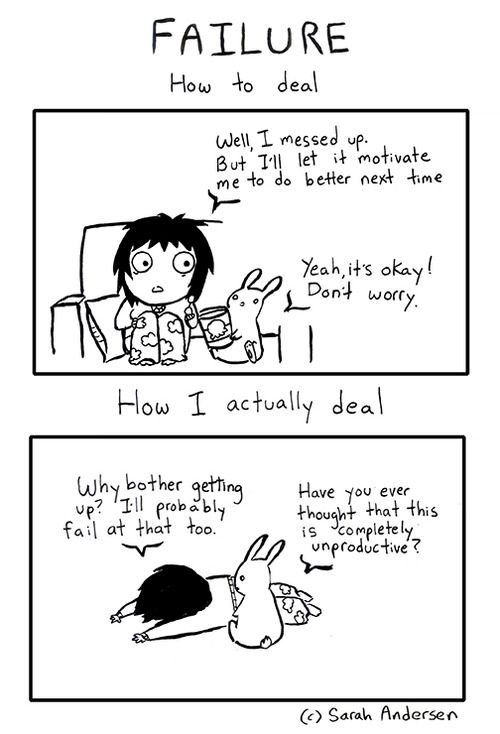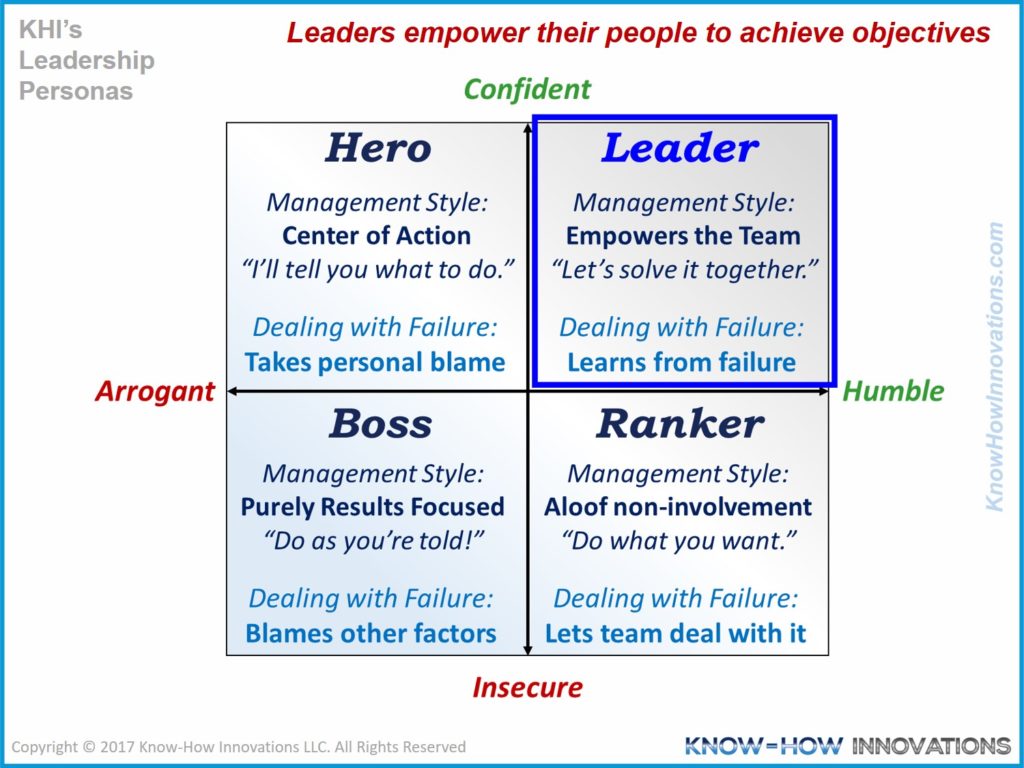Dealing with failures
Coping with failure
Failure isn't pleasant, but it is a normal part of life that is integral for success.
Coping with failure
Failure can be an unpleasant and unwanted experience. It can come in different forms - not achieving the academic grades you hoped for, being unsuccessful in a job application, a relationship breakdown, or a general setback.
While undesirable, failure is also a normal and necessary part of life. Yet, many people will go to significant lengths to avoid failing because the emotions we can feel as a result can be so painful. Nonetheless, a fear of failure can hold us back from taking up the opportunities we might need to succeed - so, a more helpful approach is not to avoid situations that might lead to potential failure, but to change the way we perceive it.
Top tips for coping with failure
Give yourself permission to feel
When we fail, we can experience a range of uncomfortable emotions such as shame, disappointment, sadness, worry, anger, and embarrassment, amongst others. These emotions hurt, and our instincts are often to escape from them by suppressing or avoiding them. While this can bring a short-term sense of relief, it does not resolve the issue which will usually show up again, or can get in the way of healthy processing of our emotions. Rather than struggling with our feelings, it can be more helpful to allow them to be. First, try to identify and label the emotion. Then, allow yourself time to experience it, remembering that failure is a part of everyone's life experience, and actually, crucial to success.
Practise self-compassion
Self-compassion is an important step in taking care of yourself when you're coping with failure. Once you have acknowledged that you are experiencing something painful, extend the same compassion you would often give to others, to yourself. Self-compassion involves being warm, caring, and understanding towards yourself, instead of judging and criticising.
This approach is far more effective as humans are innately flawed, and will inevitably make mistakes from time to time. By practising self-compassion, you are accepting your humanity and the reality that things do not often go the way we would like. This allows self-compassionate people to be more resilient to try again when they don't meet their goals.
By practising self-compassion, you are accepting your humanity and the reality that things do not often go the way we would like. This allows self-compassionate people to be more resilient to try again when they don't meet their goals.
Examples of ways to practice self-compassion include asking yourself how you would treat a friend if they were in a similar situation, beginning a self-compassion journal, or taking a self-compassion break.
Reflect on the experience and adopt a growth mindset
Although painful, we can learn and grow from our past failures. Asking yourself, 'What can I learn from this experience?', or 'What useful information can I gain from this experience to take forward?' may prepare you better for the next challenge, and foster resilience in the face of stress and hardship.
When reflecting on failure, it can also be helpful to perceive it from a growth mindset as opposed to a fixed mindset. A fixed mindset is when you believe that your qualities and skills are fixed, and therefore, cannot change no matter what you do (e. g., "What's the point in trying if I'm going to fail?"). In contrast, a growth mindset is when you believe that your qualities and skills can develop and improve with time and experience (e.g., "It's always good to try, failure is a learning curve.").
g., "What's the point in trying if I'm going to fail?"). In contrast, a growth mindset is when you believe that your qualities and skills can develop and improve with time and experience (e.g., "It's always good to try, failure is a learning curve.").
Experiencing a failure doesn't mean you're not good enough, it might be you just haven't quite figured it out yet.
Revisit your goals and create a plan for the future
Dwelling on past failures for longer than necessary will keep you stuck. Once you have given yourself sufficient time to feel the emotions associated with the failure, shown yourself kindness and care in the midst of it, and reflected on the learnings from the experience and identified areas for improvement - it is time to review your goals and create a plan for the future.
At this stage, it is important to consider if your goal is realistic and achievable. Developing SMART goals as well as utilising planning tools are a good place to start. Importantly, keep in mind that goal setting and planning is more likely to be successful if the goal is important to you and aligns with your values.
What can I do next?
- Watch these videos on the research behind concepts that might help you cope with failure. These include understanding concepts such as grit, your study mindset, and the power of believing you can improve.
- Explore resources on developing your study skills at Academic Skills. You can also attend workshops or make an appointment with an Academic Skills Adviser.
- Speaking to a CAPS counsellor can help you further understand and process your experience of failure, and develop skills to cope with setbacks in a healthy way. We also offer various workshops that may help you better cope with difficult emotions and enhance your learning experience.
If you'd like more support, come along to one of our workshops or make an appointment for individual counselling.
Explore student workshops
Make a counselling appointment
Dealing with Failure | SkillsYouNeed
We all have bad days and weeks, when nothing seems to go right. We all also have times when we fail to achieve something that we really wanted and find it hard to cope.
We all also have times when we fail to achieve something that we really wanted and find it hard to cope.
However, some people seem much more able to pick themselves up and dust themselves down after these experiences than others.
These people are not intrinsically ‘better’ in any way: they have simply developed some positive habits and skills that help them to overcome failure and turn it into a more positive experience. In fact, they use failing as a way to learn and improve. This page discusses and explains some of these skills and shows how you can develop an ability to deal more gracefully with failure.
Understanding Failure
If you can meet with triumph and disaster, and treat those two imposters just the same…
Rudyard Kipling, If.
Some people, such as Rudyard Kipling in his famous poem If…, have suggested that success and failure are two sides of the same coin. In other words, neither really matters. Whatever happens, you have to pick yourself up and move on. This approach was perhaps typical of the Victorians. They felt that it was important to be able to win and lose gracefully—and that it was not appropriate to show your emotions, whether happy or sad.
Whatever happens, you have to pick yourself up and move on. This approach was perhaps typical of the Victorians. They felt that it was important to be able to win and lose gracefully—and that it was not appropriate to show your emotions, whether happy or sad.
We have perhaps become a little wiser about the importance of recognising and showing your emotions. However, being able to win and lose gracefully is still an attitude that it might be appropriate to cultivate.
Failing to win a sports competition, especially a major event that you have been working towards for several years, or to get a promotion or pay-rise, can feel devastating at the time. When you look back later over the whole of your life, however, it is unlikely to feature as one of your defining events—especially if you have later gone on to succeed in the same field. When humanity looks back over the last 500 years, your ‘failure’ certainly won’t feature.
In other words, it doesn’t really matter all that much to anyone else. In a few years, it won’t even matter to you. It makes sense that it shouldn’t matter now.
In a few years, it won’t even matter to you. It makes sense that it shouldn’t matter now.
Of course, this is easier said than done, but there are things that you can do that will help make it ‘not matter now’.
Ways to Manage Failure
1. Recognise and accept your emotions
Failure hurts, at least in the first instance, and you need to accept that. Trying to minimise your feelings or distract yourself can be counter-productive in the longer term. Just recognise your feelings for what they are and allow yourself time to hurt a bit.
Don’t, however, dwell on it for too long. That, too, is counter-productive, especially if you blame yourself.
Take a few days for the pain to lessen, and then start to move on.
2. Don’t make it personal
One reason why some people find failure devastating is that their identity is tied up in succeeding.
In other words, when they fail, they see themselves as a failure, rather than perceiving that they have experienced a setback. Try not to see failure or success as personal: instead, it is something that you experience. It does not change the real ‘you’.
Try not to see failure or success as personal: instead, it is something that you experience. It does not change the real ‘you’.
This comes back to Kipling’s point: success and failure are not intrinsic parts of you. No part of your identity should be ‘I am a success’ or ‘I am a failure’.
3. Don’t worry what anyone else will think
Sometimes our views about success and failure are tied up in what other people will think about us, or about how we think they will judge us.
You cannot ever control what other people think. Nor should you ever do something simply because it will please other people.
It is easier to accept both success and failure if you define them in your own terms, and do things because you want to achieve, not because you think other people will be pleased.
There is more about this idea of measuring ourselves by others’ standards in our page on status anxiety.
4.
 Take the right amount of responsibility
Take the right amount of responsibilityWe have all met people who are always ready to blame others or events for their lack of success.
- “The referee was biased!”
- “The teacher doesn’t like me, that’s why my mark was so low.”
- “If only I hadn’t been ill last summer, I wouldn’t have missed several weeks of training.”
It is important to recognise when other, external factors have affected your success. You don’t need—and should not try—to blame yourself for everything, particularly if it is outside your control.
It is, however, also important to recognise what you yourself could have done to improve matters. For example, could you have trained or worked harder? Was your revision really all that it could have been? Did you really prepare for that interview in the best possible way?
Take responsibility for the factors over which you have control, and don’t be tempted to hide behind excuses.
5. Use failure as a way to improve
Don’t think of failure as failure. Instead, think of it as life’s way of showing you that you need to improve, and how to do so.
In particular, ask yourself what you could have done differently to achieve a better result. Then consider how you could put that into practice to help you to improve for next time.
Case study: Rising from the ashes of failure
In 1999, the England Rugby Union team lost to South Africa in the quarter-finals of the World Cup. Jonny Wilkinson, the fly-half, later commented that he had felt at least partly responsible for this disappointing and early exit from the competition, because he had not played very well. He said that this had encouraged him to work harder in the next few years.
Wilkinson was known for his obsessive approach to practising his kicking. He practised for hours each day from slightly different places on the field, until his accuracy became almost legendary.
In 2003, his persistence paid off. England won the World Cup in the final minute of extra time, with a drop goal from Wilkinson.
England won the World Cup in the final minute of extra time, with a drop goal from Wilkinson.
Would this have happened without the ‘failure’ in 1999? It is impossible to say, but Wilkinson himself certainly put some of the credit in that direction.
Think about failure differently, and your approach to both it, and the future, will be different.
Further Reading from Skills You Need
The Skills You Need Guide to Personal Development
Learn how to set yourself effective personal goals and find the motivation you need to achieve them. This is the essence of personal development, a set of skills designed to help you reach your full potential, at work, in study and in your personal life.
The second edition of or bestselling eBook is ideal for anyone who wants to improve their skills and learning potential, and it is full of easy-to-follow, practical information.
Winning and Losing with Grace
We try to teach children to win and lose games with grace: to accept the ‘two imposters as the same’.
We tell them not to ‘crow’ or ‘gloat’ when they have won, and we encourage them to accept defeat when they have lost. As adults, the wins and losses may not necessarily be on the sports field, but perhaps we can all learn a little from the idea that failure is only temporary.
Dealing with Failure: 3 Steps to Regain Peace of Mind
Tuesday, November 8, 2022
Vasily Khmelnitsky Foundation
Opinions
Shutterstock
Motivation
What to do if there were too many failures in a day or a week
When there are too many mistakes at work or in business, people lose faith in themselves. At some stage, it begins to seem that we are only capable of failure. But this, of course, is not the case. K.Fund Media tells how you can correct mistakes and restore peace of mind.
Admit all your mistakes
The most difficult moment for a professional is when he is forced to admit that he did not meet the deadlines or did not follow the instructions for completing the work. It's bad when you realize that you're letting people down, and even worse when you know the negative impact of your own mistakes.
It's bad when you realize that you're letting people down, and even worse when you know the negative impact of your own mistakes.
The first step to regaining control of the situation is to post everything that has been done or not done. Sometimes this can be done in an informal conversation with superiors, during a short meeting at which you need to break everything down into points.
This will allow you not only to carefully consider all your mistakes, but also to demonstrate to the management and team that you are not one of those who hide behind their shortcomings.
You can also show your transparency to employees that you may need help.
Identify what could have been done differently
None of us go out of our way to fail unless your goal is to get yourself fired. Sometimes the work is so burdensome that it's hard to focus on something for a long time without being distracted by cat video memes on the Internet.
Review the first step you took while doing the job and remember all the circumstances that led to the oversight. Perhaps you failed to successfully complete the project due to insufficient attention to its implementation? Maybe you took on too many tasks and this led to overload? Maybe, unlike how it seemed to you initially, in fact, you did not fully understand your task? Think about the result of your difficult week. Surely the matter was not limited to one single problem.
Perhaps you failed to successfully complete the project due to insufficient attention to its implementation? Maybe you took on too many tasks and this led to overload? Maybe, unlike how it seemed to you initially, in fact, you did not fully understand your task? Think about the result of your difficult week. Surely the matter was not limited to one single problem.
Make a plan of action to correct your mistakes
After analyzing what happened and understanding the reasons, you can start thinking about how to prevent similar troubles from occurring in the future. Of course, it is impossible to avoid new mistakes in the future. But by doing the above, you can improve your competence in those segments where the results of your work have left much to be desired.
If you haven't paid enough attention to the project, make a list of things to do so you don't forget important details.
If you've been overwhelmed with too many tasks, reevaluate your to-do list
As soon as there are too many, ask colleagues for help. If you realize that the instructions weren't clear enough, clarify the points you didn't understand and make sure next time everything will be perfectly clear.
If you realize that the instructions weren't clear enough, clarify the points you didn't understand and make sure next time everything will be perfectly clear.
If you're mad at yourself for the past week's failures, don't worry - most of us (if not all) got through it. You won't be able to remove a bad experience, but you will be able to rehabilitate yourself faster than you think.
However, it is important to be honest with yourself, but your talent and fortitude will help restore balance.
Stanislav Gorbachevsky Owner of the FORS group of companies
I don't have a universal tablet on how to survive a series of failures at work. I am sure that the door opens for those who knock. Accordingly, my choice is to work as much as possible. All successful people, like Jack Ma, Elon Musk, work over 100 hours a week, and I think this is normal.
Another way to survive the "black" period is to be distracted. In this regard, I choose sports. It helps to switch and reset the brain. I am a candidate master of sports in boxing, but lately I have been doing crossfit and just going to the gym.
I am a candidate master of sports in boxing, but lately I have been doing crossfit and just going to the gym.
Marina Shiyan Head of Marketing Department, MIM Business School
I won't lie, I experience black bars very hard - I mentally “rewind the tape” to fix where the mistake was, what could have been done differently. Such emotional involvement seems normal to me and it is a signal, first of all, for myself, that I care, and I am doing what I love. When I stop worrying, it will actually be a wake-up call.
Of course, I try to switch as much as possible and not take problems with me out of the office, it doesn't always work out, but I'm working on it. My recipe for switching is simple and even primitive: sit in silence, be silent. For recharging, I do not need external sources. And what motivates me is the desire to see the result of the work, it is what I will remember, and not what difficulties were on the way. It has been proven time and time again.
Based on The Muse
Share:
See also
- 5 morning habits that make us gain weight
- One twin remained on Earth, while the other spent a year in space.
 And that's what turned out
And that's what turned out
Subscribe to news!!
Thank you! Check your email to confirm your subscription
Scroll
Subscribe to news!!
Thank you! Check the specified mail to confirm the subscription
How to survive a career failure – Work.ua
At work, success is sometimes followed by a streak of failure. Here's what experienced people advise on how to get through tough times and learn from them important lessons that will help you achieve better results in the future.
They say that the path to success lies through a chain of failures. For example, Thomas Edison was only able to invent the light bulb after 10,000 failures, which he himself called a success because he "found 10,000 ways that didn't work." At the same time, problems at work often unsettle, make you doubt your abilities and your future.
Work.ua publishes advice from James Altucher, investor, entrepreneur, writer and author of popular articles "Reinvent Yourself: Where to Start to Change Your Life", "9 Things to Do if You're Fired" and "10 Signs that you need to quit as soon as possible”, about how to effectively overcome difficulties.
Admit failure
Financial swindler Bernie Madoff said of his fund: “At first things were good, then not so good, and then it was embarrassing to talk about.” And then the situation worsened so much that he appeared before the court.
A mistake becomes a failure, and it becomes a total failure if we allow it to happen. Be honest with yourself and admit your mistake, even if you are afraid of falling in the eyes of other people. Yes, you will no longer seem to them as smart and flawless as before, but you will be able to stop the fall and prevent a slip from turning into a disaster. Honesty is the first step to learning from your mistakes.
Ask for help
When you find yourself in a difficult situation, reach out to people who can help you. But remember that you need to help in return. It's like a conversation: if only one interlocutor speaks, the second one starts to get bored. So do return favors as soon as possible.
But remember that you need to help in return. It's like a conversation: if only one interlocutor speaks, the second one starts to get bored. So do return favors as soon as possible.
At my first company I needed to attract customers, at my second I needed to raise money, at my third I needed to make a website, at my fourth I needed help again. Even in writing articles, five people help me - and I also try to support them when I can.
Surround yourself with the right people
The way out of a difficult situation is 95% dependent on what kind of people are around you. Once I had to work with unreliable partners. I hoped that the situation would improve over time, but this did not happen. And I had to break the contract with them.
It is very difficult to assess one's environment. Make a list of the people you work and communicate with, and then ask yourself: when I think about them, how do I feel - good or bad? Listen carefully to your feelings. Perhaps you have known some of them for a long time and the whole history of your relationship is a continuous struggle. Stay away from unpleasant people, because the worse you feel, the worse your life ends up being.
Stay away from unpleasant people, because the worse you feel, the worse your life ends up being.
Be realistic
It is important to understand that not everything goes according to plan in reality. For example, in the first seventeen years of her career, writer Teresa Regan wrote at least twenty books, all of which were rejected by publishers. Then she decided to publish the book herself, and it became a bestseller. But Teresa was a realist: she understood that she had talent and that publishers did not believe in her. Having assessed all the risks, the writer managed to break through and succeed in an extremely difficult area, doing what she truly loves.
I once launched a website myself, but it was not popular. I made a difficult decision and closed it. And then he launched a new one, which attracted millions of users.
Accept defeat
Sometimes people come to me and say, "I should be paid a lot of money." In fact, they are on the verge of being fired. It doesn't matter what you do: no one is obliged to show signs of respect that only you consider deserved.
It doesn't matter what you do: no one is obliged to show signs of respect that only you consider deserved.
Jan Kum was not hired by Facebook, although he was a top notch programmer. Then he created WhatsApp, and then sold it to the same Facebook for 19billion. But he didn't shout "Damn it, they should hire me, they should respect me!"
Be grateful for what you have - don't ask for more. After all, it was your actions that led to the situation in which you are. Use connections, ideas, skills and achieve your goals with humility.
Learn from your mistakes
I once had a chance to talk to one of my favorite comedians, Marina Franklin. I asked how long it took to develop the talent. She replied: eleven years. She recorded all her performances and then looked at the tapes to understand what was wrong.
One should carefully examine one's own failures and think about what could be done better. Only the analysis of your mistakes in work or relationships can change the situation.














